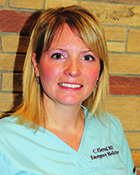This department offers
- Emergency care
- Trauma care
Call 911 immediately if someone is unconscious, having trouble breathing, has a serious injury or may be having a heart attack.
Platte Valley Hospital’s Emergency department provides you with the right care whenever you need it. Whether it’s illness or injuries requiring immediate care, or complex medical emergencies, our emergency and trauma team is there to take care of your critical needs.
Our team of emergency doctors, trauma and specialty surgeons, specialty-trained nurses, technicians, pharmacists, care managers and others work together to provide lifesaving treatments and personal care. Our holistic approach to care means that we work with you and your family to do what’s best for your health care needs.
Trauma Designation: Level III
Our Trauma Center is equipped to treat a variety of traumatic injuries, including head injuries, broken bones and injuries caused by accidents or violence. Most emergency and trauma departments are identified at different levels ranging from Level I to Level V Trauma Centers, depending on the availability of specialists and specialty treatment.
Trauma Center levels
A facility earns the title of “designated trauma center” when it meets requirements established by state or local government authorities. The American College of Surgeons verifies the designation of Trauma Centers as Level, I, II, III, IV or V. Levels depend on the types of resources available, and the number of trauma cases handled each year.
The American Trauma Society provides a guide to the levels of Trauma Centers. In brief, services by level signify:
- Level l – Provides total care for every aspect of injury – from prevention through rehabilitation.
- Level ll - Definitive care for complex and severe trauma patients.
- Level lll - Initial evaluation and stabilization (surgically if appropriate) to the trauma patient.
- Levels IV and V - Initial evaluation, stabilization, diagnostic capabilities and transfer to a higher level of care.
Forensic Nurse Examiner Program
Platte Valley launched the Forensic Nurse Program in its Emergency Department in January of 2024. The program provides a critical, compassionate service for survivors through specially trained Forensic Nurse Examiners, equipment, and specialized patient care facilities to treat and collect forensic evidence from those who have experienced sexual violence and domestic abuse. This program is available 24/7.
A dedicated room is provided with shower facilities where an interview and physical exam is conducted. The entire process is private and completely confidential and conducted by trauma-informed professionals.
This program enables survivors to get treatment and forensic evidence is collected if they choose to report the crime. Platte Valley is one of the few hospitals in Colorado to offer this program and the hospital anticipates treating more than 400 patients from across the state in 2024.
This program represents a partnership with the Adams County District Attorney's Office and the Brighton Police Department and is 100% funded by grants and donations.
For questions, please contact the forensic team at PeaksPlatteValley-FNE@imail.org or 303-498-1970. If you are transporting a patient to Platte Valley for these services, please call 303-498-1911 to notify the Emergency Department.
Our emergency and critical care providers
Helpful emergency care information
Emergency services
It’s crucial that you get the care you need, when you need it. Intermountain provides emergency services 24/7. Speed is crucial when you need critical care, and our goal is to see you within 30 minutes of your arrival to our emergency departments.













